新人教版八年级英语上册时态专项知识点及练习题汇总
八年级英语4种时态复习及练习 人教版上册
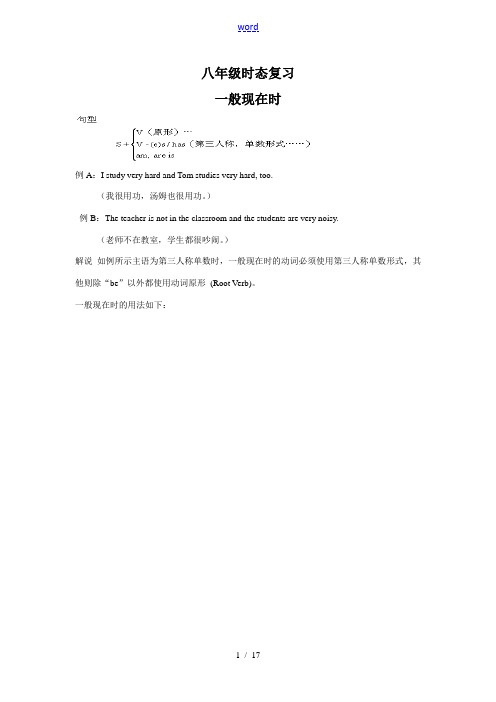
八年级时态复习一般现在时例A:I study very hard and Tom studies very hard, too.(我很用功,汤姆也很用功。
)例B:The teacher is not in the classroom and the students are very noisy.(老师不在教室,学生都很吵闹。
)解说如例所示主语为第三人称单数时,一般现在时的动词必须使用第三人称单数形式,其他则除“be”以外都使用动词原形(Root Verb)。
一般现在时的用法如下:解说文法上一般现在时所指的“现在(at the time of speaking)”其实其观念并非是绝对的。
这里所指的现在是在表明说话时存在着的事物,其时间领域含盖着过去,也将延伸及将来。
例如:It is very hot today.(今天天气很热。
---如说话时间是在中午,本句话是在表明说话时“天气很热”,实际上“天气热”的现象在中午之前就已开始存在,同时也将延伸到下午。
)例:Dogs bark at strangers.(狗看到陌生人就会吠。
──这句话是在谈狗的习性,说话时不一定有狗正在吠,而狗的这种习性可以追溯及远古,当然也将延伸到将来。
)因此,一般现在时所指的“现在”可以图示如下:一般现在时常可用时间副词如“today,this + time (this week, this year, …),now,right now,at present,etc.”来修饰。
△动词第三人称单数的规则变化1. 一般情况:加-s 例:reads,writes,says2. 以s,x,ch,sh和部分以o结尾的词加-es 例:teaches,washes,guesses3. 以辅音字母+y结尾的词变y为i再加-es 例:try—tries,carry—carries.☆☆☆[一般现在时的用法] 简述1) 经常性或习惯性的动作,常与表示频腮度的时间状语连用。
人教版英语八年级上英语动词的时态复习总结附解析推荐精选

人教版英语八年级上英语动词的时态复习总结附解析推荐精选一、初中英语动词的时态1.They their holidays in Paris last summerA.spend B.spentC.will spend D.are spending【答案】B【解析】句意:去年,他们在巴黎度假了。
本题考查动词的时态A. spend 花费,度过,是动词原形 B. spent 度过,是动词的过去式 C. will spend 将要度过,是将来时态 D. are spending。
正在度过,是现在进行时。
根据题意,去年度过的。
故选B。
2.Her son Coke, but now he milk.A.used to drink; is used to drinking B.used to drinking; drinksC.is used to drinking; used to drink D.was used to drink; is drinking【答案】A【解析】【详解】句意:她儿子过去常喝可乐,但现在他习惯喝牛奶。
used to do过去常常做;be used to doing sth习惯于做某事;drinks喝,第三人称单数形式;is drinking现在进行时,根据转折词but,可知前句表示过去喝可乐,后句表示习惯于喝牛奶,故选A。
3.The teacher came into the classroom while the students _________ their homework. A.are doing B.did C.were doing【答案】C【解析】【详解】句意:当学生们正在做作业的时候,老师走进了教室。
are doing正在做,现在进行时;did 做,是do的过去式;were doing正在做,过去进行时。
根据句中The teacher came into…可知,这句话用的是过去时态,且从句中表示的是正在进行的动作,因此应用过去进行时态,选C。
人教版八年级英语上册时态知识总结及练习
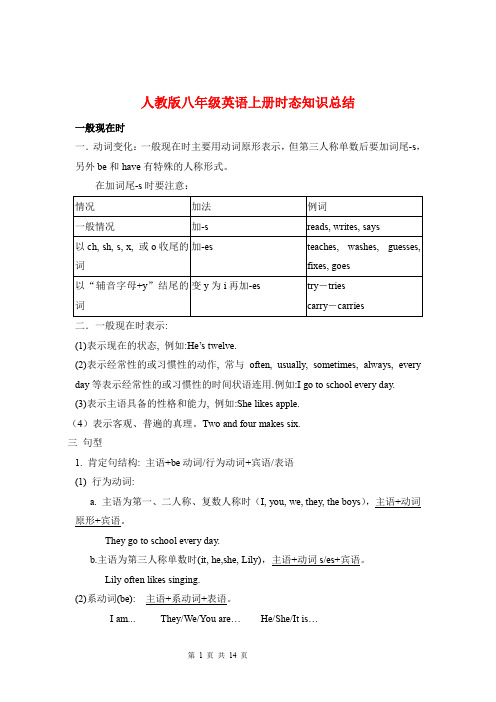
人教版八年级英语上册时态知识总结一般现在时一.动词变化:一般现在时主要用动词原形表示,但第三人称单数后要加词尾-s,另外be和have有特殊的人称形式。
在加词尾-s时要注意:二.一般现在时表示:(1)表示现在的状态, 例如:He’s twelve.(2)表示经常性的或习惯性的动作, 常与often, usually, sometimes, always, every day等表示经常性的或习惯性的时间状语连用.例如:I go to school every day. (3)表示主语具备的性格和能力, 例如:She likes apple.(4)表示客观、普遍的真理。
Two and four makes six.三句型1. 肯定句结构: 主语+be动词/行为动词+宾语/表语(1) 行为动词:a. 主语为第一、二人称、复数人称时(I, you, we, they, the boys),主语+动词原形+宾语。
They go to school every day.b.主语为第三人称单数时(it, he,she, Lily),主语+动词s/es+宾语。
Lily often likes singing.(2)系动词(be): 主语+系动词+表语。
I am... They/We/You are… He/She/It is…2.否定句结构: 主语+be动词/行为动词+宾语/表语(1) 行为动词:a. 主语为第一、二人称,复数人称时,主语+don’t+动词原形。
They don’t go to school every day.b.主语为第三人称单数时,主语+doesn’t +动词原形。
Lily doesn’t like singing.(2)系动词(be): 主语+is/am/are后加not+表语I am not a worker.3. 一般疑问句结构:(1)行为动词a. 主语为第一、二人称,复数人称时,Do+they/we/you+动词原形Do they go to school every day? (Yes, they do. No, they don’t.)b.主语为第三人称单数时,Does +he/she/iIt+动词原形Does Lily often like singing? (Yes, she does. No, she doesn’t.)(2) 系动词(be): is/am/are+主语+表语Are you a worker? (Yes, I am. No, I’m not.)4.特殊疑问句结构特殊疑问词(what, how often, which, where,who)+一般疑问句?(1)行为动词What do they do every day?How often does Peter go fishing?(2) 系动词(be):Who is the girl at that gate?一般过去时一.动词变化:一般过去时主要表示过去的动作或状态,在句中由主语+动词的过去式来表达。
人教版英语八年级上英语动词的时态复习总结含答案推荐精选

人教版英语八年级上英语动词的时态复习总结含答案推荐精选一、初中英语动词的时态1.---Helen, When did you moved here?---I______ here since two years ago.A.moved B.lived C.have moved D.have lived【答案】D【解析】试题分析:句意:―海伦,你什么时候搬到这儿的?―从两年前我就住在这儿。
表示从两年前一直延续到现在的动作,用现在完成时态,A、B错。
move是一个非延续性的动作,不能与表示一段时间的状语since two years ago连用,live是延续性动作,可以与since two years ago连用。
故选D。
【考点定位】考查动词时态辨析。
2.I think I _ my new project tomorrow.A.start B.started C.will start D.was starting【答案】C【解析】句意:我想我明天将要开始我的新项目。
本题考查动词的时态。
A. start 开始,是动词原形 B. started 开始,是动词的过去式 C. will start 将要开始,是动词的将来时 D. was starting就要开始,是过去将来时。
根据句意选C。
3.– Would you like to watch The Great Wall 《长城》with me?-- Certainly. I don’t mind ________ it again although I ______ it twice.A.to see, saw B.seeing, have seen C.to see, have seen D.seeing, saw【答案】B【解析】句意:——你愿意跟我去看《长城》吗?——当然了,尽管我已经看了两遍,但我不会介意再去看一遍。
mind doing sth.介意做某人,结合句意,首先排除A,C;根据"I don't mind ___ it again"和"although"可知尽管我已经看了两遍,但我不会介意再去看一遍.所以看过两遍用现在完成时,答案选B。
新人教版八年级上册英语时态精选练习100题附答案[1]
![新人教版八年级上册英语时态精选练习100题附答案[1]](https://img.taocdn.com/s3/m/840ac0b3f01dc281e43af0b3.png)
新人教版八年级上册英语时态精选练习100题附答案(word版可编辑修改)新人教版八年级上册英语时态精选练习100题附答案(word版可编辑修改) 编辑整理:尊敬的读者朋友们:这里是精品文档编辑中心,本文档内容是由我和我的同事精心编辑整理后发布的,发布之前我们对文中内容进行仔细校对,但是难免会有疏漏的地方,但是任然希望(新人教版八年级上册英语时态精选练习100题附答案(word版可编辑修改))的内容能够给您的工作和学习带来便利。
同时也真诚的希望收到您的建议和反馈,这将是我们进步的源泉,前进的动力。
本文可编辑可修改,如果觉得对您有帮助请收藏以便随时查阅,最后祝您生活愉快业绩进步,以下为新人教版八年级上册英语时态精选练习100题附答案(word版可编辑修改)的全部内容。
新人教版八年级上册英语时态精选练习100题附答案(word版可编辑修改)新人教版八年级上册英语时态精选练习题附答案1. Li Ping often _____ (read) English in the morning。
2。
_____ he _____ (clean) the windows once a week?3. The workers _____ (have) sports on the playground now。
4. How long ___ you __ (stay) there the day before yesterday?5. Who _____ (listen) to the music?6. When I ____ (be) a middle school student, I often ___(sing).7。
His parents ____(go) to the Great Wall tomorrow morning.8. ____ they _____ (study) Japanese next term?9。
人教版英语八年级上英语动词的时态复习总结含解析推荐精选
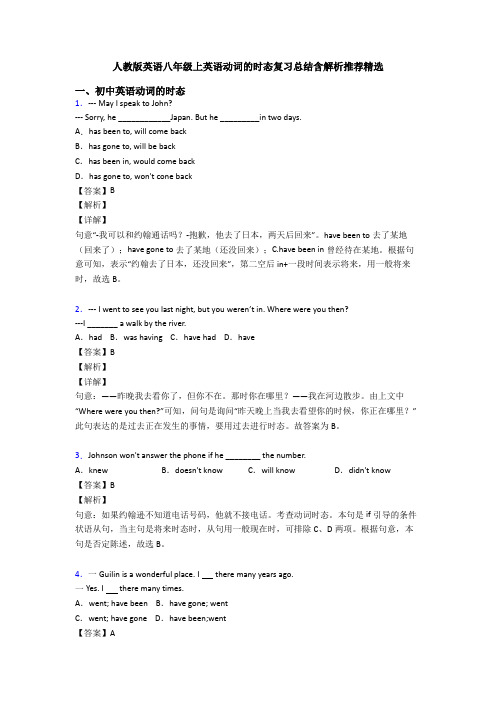
人教版英语八年级上英语动词的时态复习总结含解析推荐精选一、初中英语动词的时态1.--- May I speak to John?--- Sorry, he ____________Japan. But he _________in two days.A.has been to, will come backB.has gone to, will be backC.has been in, would come backD.has gone to, won't cone back【答案】B【解析】【详解】句意“-我可以和约翰通话吗?-抱歉,他去了日本,两天后回来”。
have been to去了某地(回来了);have gone to去了某地(还没回来);C.have been in曾经待在某地。
根据句意可知,表示“约翰去了日本,还没回来”,第二空后in+一段时间表示将来,用一般将来时,故选B。
2.--- I went to see you last night, but you weren’t in. Where were you then?---I _______ a walk by the river.A.had B.was having C.have had D.have【答案】B【解析】【详解】句意:——昨晚我去看你了,但你不在。
那时你在哪里?——我在河边散步。
由上文中“Where were you then?”可知,问句是询问“昨天晚上当我去看望你的时候,你正在哪里?”此句表达的是过去正在发生的事情,要用过去进行时态。
故答案为B。
3.Johnson won't answer the phone if he ________ the number.A.knew B.doesn't know C.will know D.didn't know【答案】B【解析】句意:如果约翰逊不知道电话号码,他就不接电话。
(完整)新人教版八年级上册英语时态精选练习100题附答案

新人教版八年级上册英语时态精选练习题附答案1. Li Ping often _____ (read) English in the morning.2. _____ he _____ (clean) the windows once a week?3. The workers _____ (have) sports on the playground now.4. How long ___ you __ (stay) there the day before yesterday?5. Who _____ (listen) to the music?6. When I ____ (be) a middle school student, I often ___(sing).7. His parents ____(go) to the Great Wall tomorrow morning.8. ____ they _____ (study) Japanese next term?9. What time _____ you _____ (do) your homework everyday.10. Look! The students ____ (clean) the classroom.11. —What ____ your after ____ (do) yesterday?—He ____ (write) two letters.12. There _____ (be) a football match on TV this evening.13. My father _____ (leave) for Japan tomorrow morning.14. Tom _____ (not listen) to the radio every morning.15. ____ (be) there any hospitals here twenty years ago?16. I _____(come) to see you again before long.17. _____ there ____ (be) an English evening next Saturday?18. ____ your uncle _____ (have) a meeting last Friday?19. What _____ the young pioneers ____ (do) on the hill now?20. They __________ (not go) fishing on Sunday.21. How many classes _____ you _____(have) every day?22. It's seven in the evening, Tom's family _____ (watch) TV.23. He ___ (join) the army in 1985. He __ (be) still in the army now.24. I _____ (visit) my friend next Sunday.25. If it snows tomorrow, we _____ (play) with snow.26. I _____ (make) a lot of mistakes in my test yesterday.27.— _____ it __________ (snow) outside now?—No, it __________.28. Where ______ they ____ (live)? They ____ (live) in Shanghai.29. If it _____ (rain) this morning, we won't go shopping.30. Listen! Who _____(sing)in the next room?31. The teacher _____(not teach)us a Chinese song,he _____(teach)us an English song two days ago.32. If I am free this evening,I _(help)you with your maths.33.— ________you ________(be)there tomorrow?—No,I ________.34. Where _________(be)your parents last year? They ________(be)in Xi'an.35. —Why _______ they _______(go)to the library after school yesterday?—Because they _________(want)to borrow some books.36. What _______ you _______(do)these days?37. Don't make a noise. Grandma _________(sleep).38. Sometimes he ____(help)his mother with the housework.39. Please write to us as soon as you _________(get)there.40. We ________(show)the foreign friends around Beijing when they get here.41. We'll wait till you _______(make)up your mind.42. They ______ just _______(talk)about you.43. —Where _____he ______(be)?—He _________(be)to the bank.44. —______ you______(visit)the Science Museum?—Yes,I________.45. —______she ______(tell)you the good news?—No,she _______.46. How long _______ your mother _______(teach)English in this school?---For ten years.47. We _______ already _______(draw)five pictures.48. My grandson ______________(be)ill for a week.49. —________ the train _________(arrive)?—No,not yet.50. Our physics teacher ____(not come)to work today,because he is ill.51. My brother ________(make) many American friends since he went there two years ago.52. She _______(work) in a factory for three years before she went to college.53. Mr. Brown ___(live) in London for ten years by the end of last month.54. How many English words _________ you _________(learn) by the end of last term?55. ______ they _______(pick)all the apples before the farmer got there?56. I didn't return the book to the library,because I _______(not finish) reading it.57. The boy said that he ___________(not break)the window.58. Jack said that he ___________ (not go) over his lessons yet.59. John told me that he ____ (fly) to Japan next Wednesday.60. Did she say when she ___________ (be) back tomorrow?61. The head master said he ________ (meet) some foreigners at the station soon.62. I wondered if our team ___________ (win) this evening.63. He said he _______ (not make) the same mistakes again.63. He said he _______ (not make) the same mistakes again.64. We ____ (have) a meeting at that time.65. Tom ____ (not have) breakfast yesterday morning.66. Did he know he ____ (have) an English lest the next day?67. _____ your father _____ (go) to work by bike every day?68. Mr Wang _____ (teach) us maths since 1990.69. They will have a trip to the Great Wall if it ____ (not rain) next Sunday.70. When I got home my grandmother ________(make) cakes.71. I ______ (give) the note to him as soon as school is over.72. The English song _____ (teach) now over the radio.73. English _____ (speak) all over the world.74. The Great Green Wall must _____ (build) in the world.75. Can the report ____ (write) in English?76. The mountain will __ (cover) with the trees in a few years.77. The young trees must _____ (tie) to the stick to keep it straight.78. So far, many man-made satellites have ___ (send) up into space.79. English ___________ (speak) in Canada.80. Tennis ___________ (invent) a hundred years ago.81. It ___________ (snow) hard now. We'd better ___________ (not go) home right now.82. These exercises must ___________ (do) by yourself.83. Our teacher told us time ___________ (be) life.84. We ____ (not see) each other since he ______ (leave) here.85. ___________you ever ___________(ride) a horse before?86. Miss Green ___________(be) in China for 6 years.87. We ___________ never ___________ (be) to Hawaii.88. You'd better try to give up ___________ (smoke). It's too bad to your health.89. Who is doing well in ___________ (describe) things?90. Have you finished ___________ (read) the book?91. Have you saw someone ___________ (ski) before?92. —Can a shark stop ___________ (swim)?—No, It can't93. You'd better try ___________ (do) it by yourself.94. The students kept ______(talk)about the football match.95. I had a computer lessons first. Then I went on ___________ (have) tennis lessons.96. He hopes ___________ (see) the famous football player as soon as possible.97. The boy kept ___________ (ask) strange questions to his teacher, it made the teacher unhappy.98. Edison enjoyed ___________ (try) his new ideas.99. He asked me ___________ (speak) loudly.100. Students must study hard __________ (make) our country strong.KEYS:1. reads2. Does, clean3. are having4. did, stay5. is listening6. was, sang7. will go8. Will, study9. do, do 10. are cleaning 11. did, do, wrote 12. will be13. is leaving 14. doesn't listen 15. Were16. will come / is coming 17. Will, be 18. Did, have19. are, doing 20. don't go 21. do, have 22. are watching23. joined, is 24. will visit 25. will play 26. made27. Is, snowing 28. do, live, live 29. rains 30. is singing31. hasn't taught 32. will help 33. Will, be 34. were, were35. did, go 36. are, doing 37. is sleeping 38. helps 39. get40. will show 41. make 42. have talked 43. has, been44. Have, visited, have 45. Has, told, hasn't46. have, drawn 48. has been 49. Has, arrived50. hasn't come 51. has made 52. had worked53. had lived 54. had, learned55. Had picked56. hadn't finished 57. hadn't 58. hadn't gone59. would fly 60. would be 61. would meet 62. would win63. wouldn't make 64. were having 65. didn't have66. would have 67. Does, go 68. has taught69. doesn't rain 70. was making 71. will give 72. will give 73. is spoken 74. be built 75. be written 76. be covered 77. be tied 78. been sent 79. is spoken 80. was invented 81. is snowing, not go 82. be done 83. is84. haven't seen, left 85. Have, ridden 86. has been87. have, been 88. smoking 89. describing 90. reading 91. ski 92. swimming 93. to do 94. talking 95. to have 96. to see 97. asking 98. trying 99. to speak 100. to make。
人教版英语八年级上英语动词的时态复习总结及解析百度文库
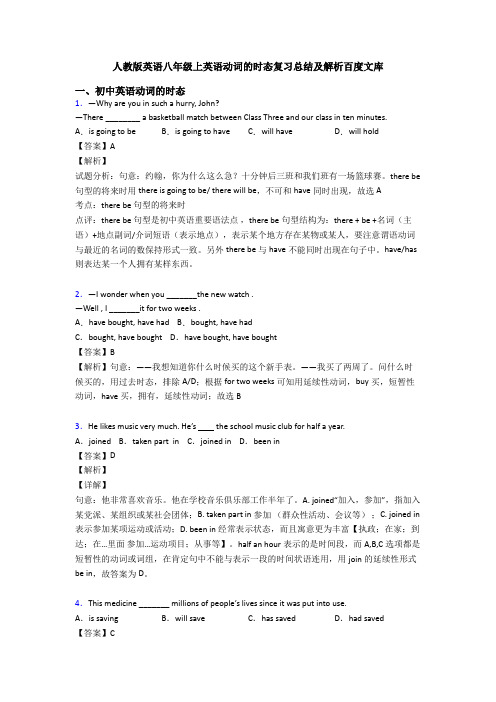
人教版英语八年级上英语动词的时态复习总结及解析百度文库一、初中英语动词的时态1.―Why are you in such a hurry, John?―There ________ a basketball match between Class Three and our class in ten minutes.A.is going to be B.is going to have C.will have D.will hold【答案】A【解析】试题分析:句意:约翰,你为什么这么急?十分钟后三班和我们班有一场篮球赛。
there be 句型的将来时用there is going to be/ there will be,不可和have同时出现,故选A考点:there be 句型的将来时点评:there be 句型是初中英语重要语法点,there be句型结构为:there + be +名词(主语)+地点副词/介词短语(表示地点),表示某个地方存在某物或某人,要注意谓语动词与最近的名词的数保持形式一致。
另外there be 与have不能同时出现在句子中。
have/has 则表达某一个人拥有某样东西。
2.—I wonder when you _______the new watch .—Well , I _______it for two weeks .A.have bought, have had B.bought, have hadC.bought, have bought D.have bought, have bought【答案】B【解析】句意:——我想知道你什么时候买的这个新手表。
——我买了两周了。
问什么时候买的,用过去时态,排除A/D;根据for two weeks可知用延续性动词,buy买,短暂性动词,have买,拥有,延续性动词;故选B3.He likes music very much. He’s the school music club for half a year.A.joined B.taken part in C.joined in D.been in【答案】D【解析】【详解】句意:他非常喜欢音乐。
八年级英语上册重点时态梳理(附试题及答案)
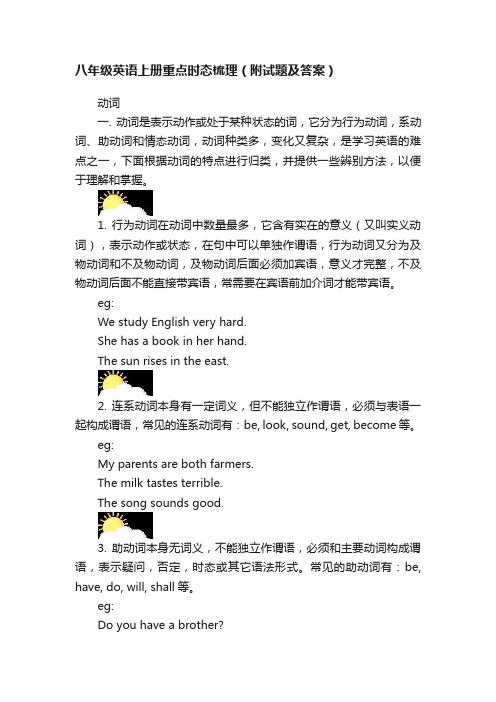
八年级英语上册重点时态梳理(附试题及答案)动词一. 动词是表示动作或处于某种状态的词,它分为行为动词,系动词、助动词和情态动词,动词种类多,变化又复杂,是学习英语的难点之一,下面根据动词的特点进行归类,并提供一些辨别方法,以便于理解和掌握。
1. 行为动词在动词中数量最多,它含有实在的意义(又叫实义动词),表示动作或状态,在句中可以单独作谓语,行为动词又分为及物动词和不及物动词,及物动词后面必须加宾语,意义才完整,不及物动词后面不能直接带宾语,常需要在宾语前加介词才能带宾语。
eg:We study English very hard.She has a book in her hand.The sun rises in the east.2. 连系动词本身有一定词义,但不能独立作谓语,必须与表语一起构成谓语,常见的连系动词有:be, look, sound, get, become等。
eg:My parents are both farmers.The milk tastes terrible.The song sounds good.3. 助动词本身无词义,不能独立作谓语,必须和主要动词构成谓语,表示疑问,否定,时态或其它语法形式。
常见的助动词有:be, have, do, will, shall等。
eg:Do you have a brother?Have you got an English-Chinese dictionary?I didn’t go to the cinema yesterday.4. 情态动词本身有词义,但不能独立作谓语,只能和主要动词一起构成谓语,表示说话者的语气和情态,情态动词没有人称和数的变化,情态动词本身可以构成疑问和否定,常见的情态动词有:can, may, must, will, shall, need等。
eg: Can you sing the English song?Everyone must get to school on time.二. 动词的时态:时态概述:作谓语的动词用来表示动作(情况)发生时间的各种形式称为时态,英语中的时态,就是通过特殊的动词词尾或加一些相关的助动词be, have(has)等,用来表示动作或事件发生的不同时间和方面。
人教版八年级第一学期语法复习I:典型时态
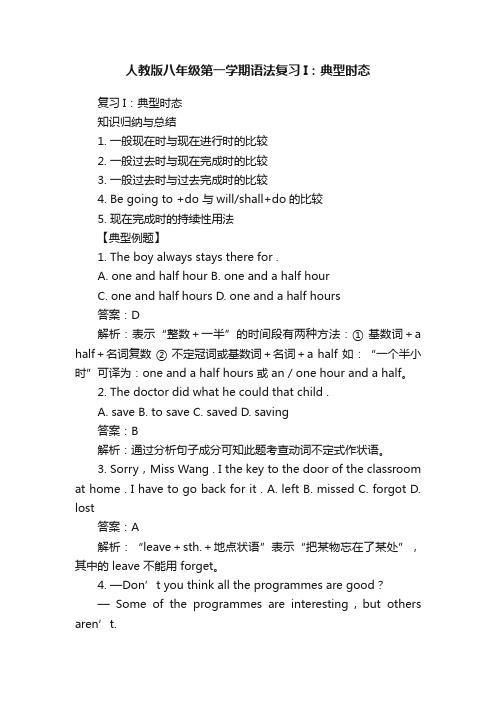
人教版八年级第一学期语法复习I:典型时态复习I:典型时态知识归纳与总结1. 一般现在时与现在进行时的比较2. 一般过去时与现在完成时的比较3. 一般过去时与过去完成时的比较4. Be going to +do 与will/shall+do的比较5. 现在完成时的持续性用法【典型例题】1. The boy always stays there for .A. one and half hourB. one and a half hourC. one and half hoursD. one and a half hours答案:D解析:表示“整数+一半”的时间段有两种方法:① 基数词+a half+名词复数② 不定冠词或基数词+名词+a half 如:“一个半小时”可译为:one and a half hours 或 an/one hour and a half。
2. The doctor did what he could that child .A. saveB. to saveC. savedD. saving答案:B解析:通过分析句子成分可知此题考查动词不定式作状语。
3. Sorry,Miss Wang . I the key to the door of the classroom at home . I have to go back for it . A. left B. missed C. forgot D. lost答案:A解析:“leave+sth.+地点状语”表示“把某物忘在了某处”,其中的 leave 不能用 forget。
4. —Don’t you think all the programmes are good?—Some of the programmes are interesting,but others aren’t.A. Yes,I doB. Yes , I don’tC. No , I doD. No,I don’t答案:D解析:否定式的一般疑问句的答语与汉语表达习惯不同,事实是肯定的,就用 yes;事实是否定的,就用 no。
新人教版八年级上册英语时态精选练习100题附答案

新人教版八年级上册英语时态精选练习题附答案 1. Li Ping often _____ (read) English in the morning. ?2. _____ he _____ (clean) the windows once a week 3. The workers _____ (have) sports on the playground now. 4. How long ___ you __ (stay) there the day before yesterday? 5. Who _____ (listen) to the music? 6. When I ____ (be) a middle school student, I often ___(sing). 7. His parents ____(go) to the Great Wall tomorrow morning.8. ____ they _____ (study) Japanese next term? 9. What time _____ you _____ (do) your homework everyday. 10. Look! The students ____ (clean) the classroom. What ____ your after ____ (do) yesterday?—11. He ____ (write) two letters.— 12. There _____ (be) a football match on TV this evening.13. My father _____ (leave) for Japan tomorrow morning. 14. Tom _____ (not listen) to the radio every morning. 15. ____ (be) there any hospitals here twenty years ago? 16. I _____(come) to see you again before long. 17. _____ there ____ (be) an English evening next Saturday? 18. ____ your uncle _____ (have) a meeting last Friday? 19. What _____ theyoung pioneers ____ (do) on the hill now? 20. They __________ (not go) fishing on Sunday. 21. How many classes _____ you _____(have) every day? 22. It's seven in the evening, Tom's family _____ (watch) TV.23. He ___ (join) the army in 1985. He __ (be) still in the army now. 24. I _____ (visit) my friend next Sunday. 25. If it snows tomorrow, we _____ (play) with snow. 126. I _____ (make) a lot of mistakes in my test yesterday. _____ it __________ (snow) outside now? —27. No, it __________.— 28. Where ______ they ____ (live)? They ____ (live) in Shanghai. 29. If it _____ (rain) this morning, we won't go shopping. 30. Listen! Who _____(sing)in the next room? he _____(teach)us an ,31. The teacher _____(not teach)us a Chinese song English song two days ago.32. If I am free this eveningI _(help)you with your maths. ,________you ________(be)there tomorrow? —33. I ________.,No—34. Where _________(be)your parents last year? They ________(be)in Xi'an. Why _______ they _______(go)to the library after school yesterday? —35.Because they _________(want)to borrow some books.—36. What _______ you _______(do)these days? 37. Don't make a noise. Grandma _________(sleep). 38. Sometimes he ____(help)his mother with the housework. 39. Please write to us as soon as you _________(get)there. 40. We ________(show)the foreign friends around Beijing when they get here. 41. We'll wait till you _______(make)up your mind. 42. They ______ just _______(talk)about you. Where _____he ______(be)? —43. He _________(be)to the bank.—______ you______(visit)the Science Museum? —44. I________.,Yes—______she ______(tell)you the good news? —45. she _______.,No— 246. How long _______ your mother _______(teach)English in this school? ---For ten years.47. We _______ already _______(draw)five pictures.48. My grandson ______________(be)ill for a week.________ the train _________(arrive)?—49. not yet.,No—50. Our physics teacher ____(not come)to work todaybecause he is ill., 51. My brother ________(make) many American friends since he went there two years ago.52. She _______(work) in afactory for three years before she went to college.53. Mr. Brown ___(live) in London for ten years by the end of last month. 54. How many English words _________ you _________(learn) by the end of last term?55. ______ they _______(pick)all the apples before the farmer got there?,56. I didn't return the book to the librarybecause I _______(not finish) reading it.57. The boy said that he ___________(not break)the window.58. Jack said that he ___________ (not go) over his lessons yet.59. John told me that he ____ (fly) to Japan next Wednesday.60. Did she say when she ___________ (be) back tomorrow? 61. The head master said he ________ (meet) some foreigners at the station soon.62. I wondered if our team ___________ (win) this evening.63. He said he _______ (not make) the same mistakes again.63. He said he _______ (not make) the same mistakes again.64. We ____ (have) a meeting at that time.65. Tom ____ (not have) breakfast yesterday morning.66. Did he know he ____ (have) an English lest the next day?67. _____ your father _____ (go) to work by bike every day?68. Mr Wang _____ (teach) us maths since 1990. 369. They will have a trip to the Great Wall if it ____ (not rain) next Sunday. 70. When I got home mygrandmother ________(make) cakes. 71. I ______ (give) the note to him as soon as school is over. 72. The English song _____ (teach) now over the radio. 73. English _____ (speak) all over the world. 74. The Great Green Wall must _____ (build) in the world. 75. Can the report ____ (write) in English? 76. The mountain will __ (cover) with the trees in a few years.77. The young trees must _____ (tie) to the stick to keep it straight. 78. So far, many man-made satellites have ___ (send) up into space. 79. English ___________ (speak) in Canada. 80. Tennis ___________ (invent) a hundred years ago. 81. It ___________ (snow) hard now. We'd better ___________ (not go) home right now. 82. These exercises must ___________ (do) by yourself. 83. Our teacher told us time ___________ (be) life. 84. We ____ (not see) each other since he ______ (leave) here.85. ___________you ever ___________(ride) a horse before? 86. Miss Green ___________(be) in China for 6 years. 87. We ___________ never ___________ (be) to Hawaii. 88. You'd better try to give up ___________ (smoke). It's too bad to your health. 89. Who isdoing well in ___________ (describe) things? 90. Have you finished ___________ (read) the book? 91. Have you saw someone ___________ (ski) before? Can a shark stop ___________ (swim)? —92. No, It can't—93. You'd better try ___________ (do) it by yourself. 494. The students kept ______(talk)about the football match.95. I had a computer lessons first. Then I went on ___________ (have) tennis lessons. 96. He hopes ___________ (see) the famous football player as soon as possible.97. The boy kept ___________ (ask) strange questions to his teacher, it made the teacher unhappy.98. Edison enjoyed ___________ (try) his new ideas.99. He asked me ___________ (speak) loudly. 100. Students must study hard __________ (make) our country strong. KEYS: 1. reads 2. Does, clean 3. are having 4. did, stay 5. is listening 6. was, sang 7. will go 8. Will, study 9. do, do 10. are cleaning 11. did, do, wrote 12. will be 13. is leaving 14. doesn't listen 15. Were 16. will come / is coming 17. Will, be 18. Did, have 19. are, doing 20. don't go 21. do, have 22. are watching 23. joined, is 24. will visit 25. will play 26. made 27. Is, snowing 28. do, live, live 29. rains 30. is singing 31. hasn't taught 32. will help33. Will, be 34. were, were 35. did, go 36. are, doing 37. is sleeping 38. helps 39. get 40. will show 41. make 42. have talked 43. has, been 44. Have, visited, have 45. Has, told, hasn't 48. has been 49. Has, arrived 46. have, drawn 50. hasn't come 51. has made 52. had worked 53. had lived 54. had, learned55. Had picked56. hadn't finished 57. hadn't 58. hadn't gone 59. would fly 60. would be 61. would meet 62. would win 63. wouldn't make 64. were having 65. didn't have 566. would have 67. Does, go 68. has taught 69. doesn't rain 70. was making 71. will give 72. will give 73. is spoken 74. be built 75. be written 76. be covered 77. be tied 78. been sent 79. is spoken 80. was invented 81. is snowing, not go 82. be done 83. is 84. haven't seen, left 85. Have, ridden 86. has been 87. have, been 88. smoking 89. describing 90. reading 91. ski 92. swimming 93. to do 94. talking 95. to have 96.to see 97. asking 98. trying 99. to speak 100. to make 6。
人教版英语初二年级英语英语动词的时态知识点含答案百度文库

人教版英语初二年级英语英语动词的时态知识点含答案百度文库一、初中英语动词的时态1.________ of the road ________ broken down. It needs ________.A.Three-fourths; was; repairedB.Three quarters; has; to repairC.Three-fourth; was; to be repairedD.Three quarters; has; repairing【答案】D【解析】句意:四分之三的路已经坏掉了,它需要被修理。
根据分数表达法,当分子超过一时,分母加s,所以排除C;根据break down坏掉和 road之间是主动关系,不用被动语态,排除A/C;need to do一般主语是人,need doing一般主语是物,need to do需要做某事,need doing需要被做;故选D2.--- Where’s my father? Could tell me?--- He to Beijing. He’ll attend an important meeting.A.goes B.is going C.has gone D.has been【答案】C【解析】【详解】句意:——我的父亲在哪里?可以告诉我吗?——他已经去北京了。
他将参加一个重要会议。
考查动词时态辨析。
根据句意语境,可知父亲不在说话的地点已经去了北京,需用现在完成时,可排除AC两项。
have been to意为“曾经去过某地”,现在已不在那里了;have gone to意为“到某地去了”,说话时作句子主语的人不在现场,故选C。
3.一Guilin is a wonderful place. I there many years ago.一Yes. I there many times.A.went; have been B.have gone; wentC.went; have gone D.have been;went【答案】A【解析】句意:-桂林是个很棒的地方。
新人教版八年级英语上册时态专项知识点及练习题汇总

新人教版八年级英语上册时态专项知识点及练习题汇总动词一. 动词是表示动作或处于某种状态的词,它分为行为动词,系动词、助动词和情态动词,动词种类多,变化又复杂,是学习英语的难点之一,下面根据动词的特点进行归类,并提供一些辨别方法,以便于理解和掌握。
1. 行为动词在动词中数量最多,它含有实在的意义(又叫实义动词),表示动作或状态,在句中可以单独作谓语,行为动词又分为及物动词和不及物动词,及物动词后面必须加宾语,意义才完整,不及物动词后面不能直接带宾语,常需要在宾语前加介词才能带宾语。
eg:We study English very hard.She has a book in her hand.The sun rises in the east.2. 连系动词本身有一定词义,但不能独立作谓语,必须与表语一起构成谓语,常见的连系动词有:be, look, sound, get, become等。
eg:My parents are both farmers.The milk tastes terrible.The song sounds good.3. 助动词本身无词义,不能独立作谓语,必须和主要动词构成谓语,表示疑问,否定,时态或其它语法形式。
常见的助动词有:be, have, do, will, shall等。
eg:Do you have a brother?Have you got an English-Chinese dictionary?I didn’t go to the cinema yesterday.4. 情态动词本身有词义,但不能独立作谓语,只能和主要动词一起构成谓语,表示说话者的语气和情态,情态动词没有人称和数的变化,情态动词本身可以构成疑问和否定,常见的情态动词有:can, may, must, will, shall, need等。
eg: Can you sing the English song?Everyone must get to school on time.二. 动词的时态:(一)时态概述:作谓语的动词用来表示动作(情况)发生时间的各种形式称为时态,英语中的时态,就是通过特殊的动词词尾或加一些相关的助动词be, have(has)等,用来表示动作或事件发生的不同时间和方面。
人教版八年级英语上册知识点汇总与练习
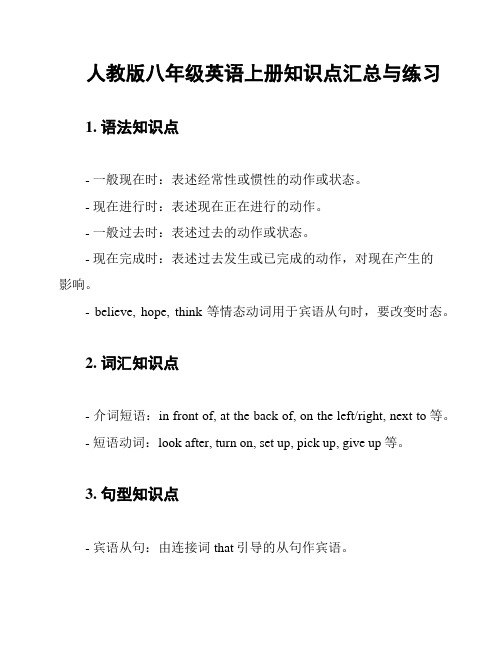
人教版八年级英语上册知识点汇总与练习1. 语法知识点- 一般现在时:表述经常性或惯性的动作或状态。
- 现在进行时:表述现在正在进行的动作。
- 一般过去时:表述过去的动作或状态。
- 现在完成时:表述过去发生或已完成的动作,对现在产生的影响。
- believe, hope, think等情态动词用于宾语从句时,要改变时态。
2. 词汇知识点- 介词短语:in front of, at the back of, on the left/right, next to等。
- 短语动词:look after, turn on, set up, pick up, give up等。
3. 句型知识点- 宾语从句:由连接词that引导的从句作宾语。
- 时间状语从句:由连接词when, before, after, while等引导的从句,用来表示时间关系。
- 目的状语从句:由连接词so that引导的从句,用来表示目的。
- 虚拟条件句:由连接词if引导的条件句,表示假设情况。
4. 阅读与写作练阅读材料:The Importance of ReadingHere are some tips to develop good reading habits:1. Set aside dedicated time for reading every day.2. Choose a variety of books based on your interests.3. Start with books that are at your reading level, and gradually challenge yourself.4. Take notes while reading to help with understanding and retention.5. Discuss the books you read with others to gain different perspectives.写作练:Write about your favorite book and explain why you like it.My favorite book is "Harry Potter and the Philosopher's Stone" by J.K. Rowling. I like this book because it takes me on a magical journey filled with adventure and excitement. The characters are well-developed and the story is captivating. I enjoy the creativity and imagination that Rowling brings to the world of Hogwarts. The book teaches important lessons about friendship, bravery, and the power of love. Overall, "Harry Potter and the Philosopher's Stone" is a book that brings joy and wonder to my life.5. 总结本文档汇总了人教版八年级英语上册的一些重要知识点,包括语法、词汇和句型。
人教版英语八年级上英语动词的时态复习总结含答案解析

人教版英语八年级上英语动词的时态复习总结含答案解析一、初中英语动词的时态1.- Mr. Black will go to Shanghai in a few days. Do you know when the earliest plane _____on Sunday?- At 10:00am.A.leaves off B.took off C.is leaving off D.is taking off【答案】D【解析】句意:——布莱克先生几天后将去上海。
你知道星期日最早的飞机什么时候起飞吗?——上午10点。
考查动词短语和时态辨析题。
leave off停止,中断(做某事);take off (飞机)起飞,都是固定短语,可知后者符合句意,可排除AC两项。
问句是时间状语从句,主句do是一般现在时,可知过去式took错误,结合答语At 10:00am.是将来的时间,故选D。
2.--- Where’s my father? Could tell me?--- He to Beijing. He’ll attend an important meeting.A.goes B.is going C.has gone D.has been【答案】C【解析】【详解】句意:——我的父亲在哪里?可以告诉我吗?——他已经去北京了。
他将参加一个重要会议。
考查动词时态辨析。
根据句意语境,可知父亲不在说话的地点已经去了北京,需用现在完成时,可排除AC两项。
have been to意为“曾经去过某地”,现在已不在那里了;have gone to意为“到某地去了”,说话时作句子主语的人不在现场,故选C。
3.—You look unhappy. What’s w rong?—No one ______ me when I was in America. Maybe they all forgot me.A.phoned B.phones C.has phoned D.had phoned【答案】A【解析】句意:-你看起来不开心,怎么了?-当我在美国的时候没有人给我打电话,可能他们都忘了我吧!题干有过去的时间状语when I was in America,需要用一般过去时态用来描述过去的一个动作。
人教版英语八年级上英语动词的时态复习总结附解析百度文库
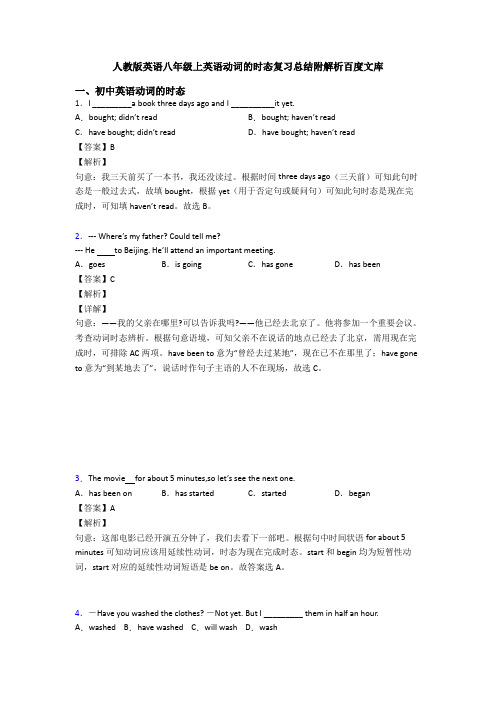
人教版英语八年级上英语动词的时态复习总结附解析百度文库一、初中英语动词的时态1.I _________a book three days ago and I __________it yet.A.bought; didn’t read B.bought; haven’t readC.have bought; didn’t read D.have bought; haven’t read【答案】B【解析】句意:我三天前买了一本书,我还没读过。
根据时间three days ago(三天前)可知此句时态是一般过去式,故填bought,根据yet(用于否定句或疑问句)可知此句时态是现在完成时,可知填haven’t read。
故选B。
2.--- Where’s my father? Could tell me?--- He to Beijing. He’ll attend an important meeting.A.goes B.is going C.has gone D.has been【答案】C【解析】【详解】句意:——我的父亲在哪里?可以告诉我吗?——他已经去北京了。
他将参加一个重要会议。
考查动词时态辨析。
根据句意语境,可知父亲不在说话的地点已经去了北京,需用现在完成时,可排除AC两项。
have been to意为“曾经去过某地”,现在已不在那里了;have gone to意为“到某地去了”,说话时作句子主语的人不在现场,故选C。
3.The movie for about 5 minutes,so let’s see the next one.A.has been on B.has started C.started D.began【答案】A【解析】句意:这部电影已经开演五分钟了,我们去看下一部吧。
根据句中时间状语for about 5 minutes可知动词应该用延续性动词,时态为现在完成时态。
人教版英语八年级上册 Unit6-7语法重点:一般将来时_专项讲解与练习 (有答案)
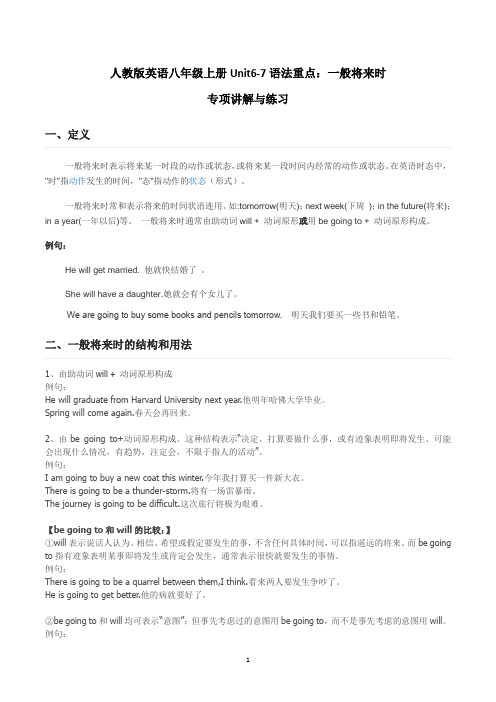
人教版英语八年级上册Unit6-7语法重点:一般将来时专项讲解与练习一般将来时表示将来某一时段的动作或状态,或将来某一段时间内经常的动作或状态。
在英语时态中,"时"指动作发生的时间,"态"指动作的状态(形式)。
一般将来时常和表示将来的时间状语连用。
如:tomorrow(明天);next week(下周);in the future(将来);in a year(一年以后)等。
一般将来时通常由助动词will + 动词原形或用be going to + 动词原形构成。
例句:He will get married. 他就快结婚了。
She will have a daughter.她就会有个女儿了。
We are going to buy some books and pencils tomorrow. 明天我们要买一些书和铅笔。
1、由助动词will + 动词原形构成例句:He will graduate from Harvard University next year.他明年哈佛大学毕业。
Spring will come again.春天会再回来。
2、由be going to+动词原形构成。
这种结构表示“决定、打算要做什么事,或有迹象表明即将发生、可能会出现什么情况,有趋势,注定会,不限于指人的活动”。
例句:I am going to buy a new coat this winter.今年我打算买一件新大衣。
There is going to be a thunder-storm.将有一场雷暴雨。
The journey is going to be difficult.这次旅行将极为艰难。
【be going to和will的比较:】①will表示说话人认为、相信、希望或假定要发生的事,不含任何具体时间,可以指遥远的将来。
而be going to指有迹象表明某事即将发生或肯定会发生,通常表示很快就要发生的事情。
- 1、下载文档前请自行甄别文档内容的完整性,平台不提供额外的编辑、内容补充、找答案等附加服务。
- 2、"仅部分预览"的文档,不可在线预览部分如存在完整性等问题,可反馈申请退款(可完整预览的文档不适用该条件!)。
- 3、如文档侵犯您的权益,请联系客服反馈,我们会尽快为您处理(人工客服工作时间:9:00-18:30)。
新人教版八年级英语上册时态专项知识点及练习题汇总
动词
一. 动词是表示动作或处于某种状态的词,它分为行为动词,系动词、助动词和情态动词,动词种类多,变化又复杂,是学习英语的难点之一,下面根据动词的特点进行归类,并提供一些辨别方法,以便于理解和掌握。
1. 行为动词在动词中数量最多,它含有实在的意义(又叫实义动词),表示动作或状态,在句中可以单独作谓语,行为动词又分为及物动词和不及物动词,及物动词后面必须加宾语,意义才完整,不及物动词后面不能直接带宾语,常需要在宾语前加介词才能带宾语。
eg:
We study English very hard.
She has a book in her hand.
The sun rises in the east.
2. 连系动词本身有一定词义,但不能独立作谓语,必须与表语一起构成谓语,常见的连系动词有:be, look, sound, get, become等。
eg:
My parents are both farmers.
The milk tastes terrible.
The song sounds good.
3. 助动词本身无词义,不能独立作谓语,必须和主要动词构成谓语,表示疑问,否定,时态或其它语法形式。
常见的助动词有:be, have, do, will, shall等。
eg:
Do you have a brother?
Have you got an English-Chinese dictionary?
I didn’t go to the cinema yesterday.
4. 情态动词本身有词义,但不能独立作谓语,只能和主要动词一起构成谓语,表示说话
者的语气和情态,情态动词没有人称和数的变化,情态动词本身可以构成疑问和否定,常见的情态动词有:can, may, must, will, shall, need等。
eg: Can you sing the English song?
Everyone must get to school on time.
二. 动词的时态:
(一)时态概述:作谓语的动词用来表示动作(情况)发生时间的各种形式称为时态,英语中的时态,就是通过特殊的动词词尾或加一些相关的助动词be, have(has)等,用来表示动作或事件发生的不同时间和方面。
eg: He reads newspapers every day.
He read the newspaper yesterday.
He is going to read the newspaper tomorrow.
(二)一般现在时:
1. 动词变化:一般现在时主要用动词原形表示,但第三人称单数后要加词尾-s,另外be 和have有特殊的人称形式。
在加词尾-s时要注意:
以ch, sh, s, x, 或o收尾的词加
读音:
2. 一般现在时主要表示:
(1)经常性或习惯性的动作,常与这样的时间状语连用:always, often, usually, sometimes等eg: We always help each other.
It often snows in winter.
I get up early every morning.
(2)表示主语现在的特征、性格、能力等。
eg: He loves sports.
Jane is an outgoing girl.
Tom and Tim both have medium height.
(3)表示客观、普遍真理
eg:
Two and four makes six.
Water boils at 100℃
The moon moves round the earth.
3. 一般现在时的疑问句一般以在句首加助动词do,does的方式构成。
第三人称单数加does,其他加do,这时动词一概用原形;动词be只需与主语位置对调就行了。
eg: Do you like English?
Do they have story books?
What does she do ever y evening?
Is she at home?
Are you good at English?
4. 一般现在时的否定式是do not(don’t)或does not (doesn’t)+动词原形来构成的,be动。
